|
|
|
Sort Order |
|
|
|
Items / Page
|
|
|
|
|
|
|
| Srl | Item |
| 1 |
ID:
121230
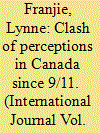

|
|
|
|
|
| Publication |
2012.
|
| Summary/Abstract |
Arab communities in the western world faced public scrutiny in the
aftermath of 11 September 2011. The Canadian Arab community, one of the
country's largest non-European ethnic populations, was no exception.1
This
scrutiny was mostly due to a failure to distinguish between the motivations
and beliefs of the 9/11 attackers and the culture of the Arab and Muslim
communities at large, which were still little-known, although they had been
present in the western world for several decades.
|
|
|
|
|
|
|
|
|
|
|
|
|
|
|
|
| 2 |
ID:
109037
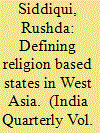

|
|
|
|
|
| Publication |
2011.
|
| Summary/Abstract |
As speculation grows about the possibility of a turbulent Egypt, Libya, Tunisia or even Algeria drifting from demanding democracy and political liberalism to establishing an Islamic state, this article, by attempting to define religion based states would want to form a background to the speculations. The author would like to point out that the coming power by a political party with a religious affiliation would not make the states into Islamic States. As a matter of fact, given the kind of external and internal forces at play in West Asia and North Africa, it would not be possible for any country to redefine the basis of its identity, let alone transform itself into a theocratic state in classical parlance. With the close of the Second World War and the establishment of nation-states in the new world order, two deviant states were created from Asia. Israel and Pakistan were created taking religion, instead of geography or history of the land or ethnicity or race or existing socio-political structures, for the foundational basis of their identity. It heralded a new era for history. These states were going to be yardsticks for later day religion based socio-political movements. If these movements were going to gain power, they would need to conform to the newly set patterns for religion based states. Re-creating a theocratic state based on classical historical lines, is no longer an option.
|
|
|
|
|
|
|
|
|
|
|
|
|
|
|
|
| 3 |
ID:
102700
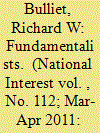

|
|
|
|
|
| Publication |
2011.
|
| Summary/Abstract |
MANY PEOPLE believe the world is-or should be-reaching a consensus on the universal and inevitable superiority of the rationalistic, humane and rights-based values of Western civilization.
|
|
|
|
|
|
|
|
|
|
|
|
|
|
|
|
| 4 |
ID:
115253
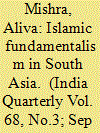

|
|
|
|
|
| Publication |
2012.
|
| Summary/Abstract |
Islamic fundamentalism is a multifarious movement with diverse manifestations, components, and contextual historical and societal conditions. While the radical Islamists, for instance, seek to impose change from above through holy wars, others pursue a bottom-up approach to bring about the re-Islamisation of the society through extensive networks of social activity. Regardless of their particularistic properties, all Islamist groups, however, share a common goal of establishing an Islamic order (nizam Islami) for the actualisation of Muslim life. The fundamentalists may not have registered considerable success in electoral terms, but they continue to dominate political discourse because their message is capable of attracting a broad spectrum of society. On the basis of a broad understanding of Islamic fundamentalism as a religio-political movement, this article attempts a comparative study of the phenomenon in Pakistan and Bangladesh, two leading Muslim states of South Asia. By examining the historical and social context, internal political developments including the role of state in promoting religious agenda and the varying impact of extraneous factors, the article argues that while Islamic fundamentalism in Bangladesh is containable, accomplishing it in Pakistan will be difficult because of the state appropriation of Islam in political discourse guaranteeing the movement's staying power.
|
|
|
|
|
|
|
|
|
|
|
|
|
|
|
|
| 5 |
ID:
115075
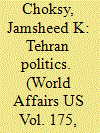

|
|
|
|
|
| Publication |
2012.
|
| Summary/Abstract |
You are not a wise man, you tyrant," raps the Iranian female singer Bahar. "Why do your clothes smell like blood??.?.?.?Why do you crush this cry for justice? The people don't deserve such disdain." Her chiding words against Supreme Leader Ayatollah Ali Khamenei go to the heart of the problem that the Islamic Republic faces: the growing illegitimacy of a cruel and inaccessible theocracy whose control over Iran might well be slipping.
|
|
|
|
|
|
|
|
|
|
|
|
|
|
|
|
|
|
|
|
|